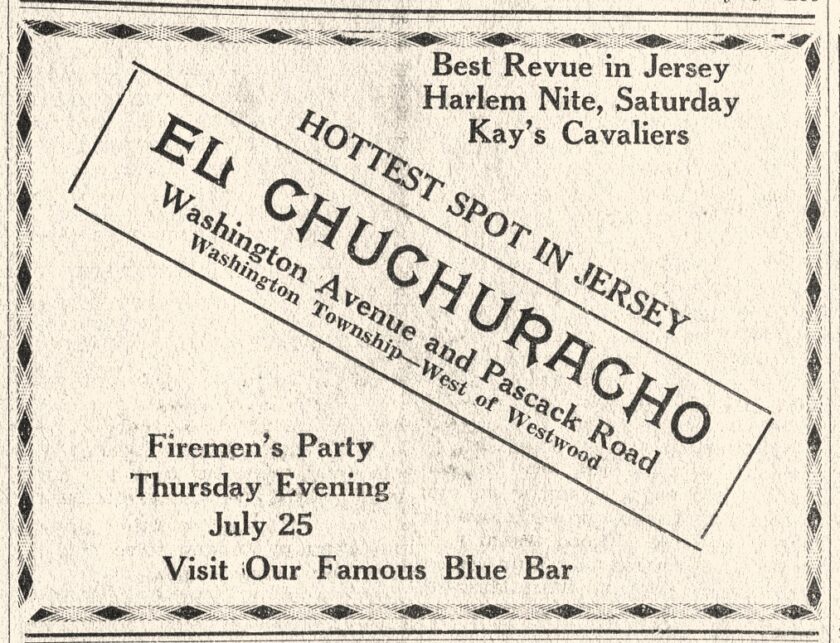
TOWNSHIP OF WASHINGTON, N.J.—Maybe the 450 people who lived in the Township of Washington in 1935 just weren’t ready for a place as exotic sounding as El Chuchuracho. This self-proclaimed “hottest spot in Jersey” was around for only one year.
Located at the southwest corner of Pascack Road and Washington Avenue, where Seasons Catering is today, El Chuchuracho was a post-Prohibition restaurant, bar, and dance hall. Proprietor was Saul “Chuchu” Zucker promised “all the gaiety and atmosphere of a New York City night club right here in the Pascack Valley.” He hired bartender Ray Preston, a mixologist who charmed patrons from behind the counter at the blue bar.
The Westwood Chronicle quipped, “What Ray doesn’t know about mixing drinks isn’t out yet.”
America was fresh out of the Prohibition era, that period from 1920 through 1933 when the sale of alcohol was illegal. By the mid-1930s, the people were eager to have their booze back—and forward-thinking businessmen were waiting in the wings to satisfy.
Thirteen (theoretically) dry years ended on Dec. 5, 1933, and within days, applications for saloon licenses were pouring in at borough offices across the Pascack Valley. Mayors and councils scrambled to set fees and place a cap on the number of licensees. Most set the fee at around $350—over $8,000 in today’s money—which went a long way toward stemming the flow of applications.
Some entrepreneurs had been closely watching the political climate and were ready to spring into action the moment the repeal took effect. The Chronicle reported on Dec. 8, 1933, just three days after Prohibition ended, that the new Park Wine and Liquor Store was already doing a hopping business on Park Avenue in Hillsdale, offering a full line of bottled beer, wine, liquors and cordials.

Throughout the 1920s and early 1930s, police had played Whac-A-Mole with bootleggers on the rural outskirts of our Pascack Valley towns. A barn hidden away from prying eyes might have cows on one side and a secret room with an illicit distillery on the other. A trapdoor in a chicken coop might reveal an underground chamber filled with barrels of mash. Lawmen went undercover at hotels and dance halls and teamed up with town officials to conduct liquor raids, many of which hit their mark.
Imagine, then, the novelty it must have been to sit in a nightclub in the mid-1930s, orchestra playing and the dance floor filled with people dressed to the nines, openly sipping your cocktail. Some popular choices at the time were the Sidecar, Gin Rickey, Bee’s Knees, highball, Old Fashioned, Manhattan, and martini.
“There never is a dull or slow night there,” the Chronicle wrote of El Chuchuracho in July 1935. “The dance music under the direction of Kay and her Rhythm Cavaliers is something that draws the same crowds back night after night.”
On at least two occasions the restaurant hosted performances by Palmer and Peaches, a Vaudeville-style comedy and dance duo who regularly appeared at Harlem’s Cotton Club.
Zucker offered drinks at reasonable prices, with no minimum or cover charge. The orchestra played on Wednesdays, Fridays, Saturdays, and Sundays. In the summer of 1935 there was a carnival-like atmosphere with balloon and streamer dances, as well as amateur talent nights that offered a $5 cash prize for first place. Every Wednesday night there was free spaghetti for all the customers.
Local organizations held events at El Chuchuracho, such as the Township of Washington Fire Department, which held its July 4th picnic on the grounds. Several weeks later, the fire department rented the place for a card party and dinner dance to raise money for equipment. Cozy little rooms on the second floor invited card players for private bridge parties.
“While this place is one of the newest in the Pascack Valley, it is holding its own in the patronage of night club devotees, one reason being that there is no formality, everyone joining heartily in the fun,” the Chronicle wrote on Sept. 27, 1935.
Why did El Chuchuracho close within a year? The answer is lost to history. In the 90 years since, this corner has always been a restaurant. Edward Short, a former mayor of Cresskill, bought the place from Zucker 1936 and reopened it as the Washington Villa, a pizzeria and cocktail lounge. In 1959 it became the seafood restaurant Fin and Claw, which was in business for decades. It became Seasons in 1989.
